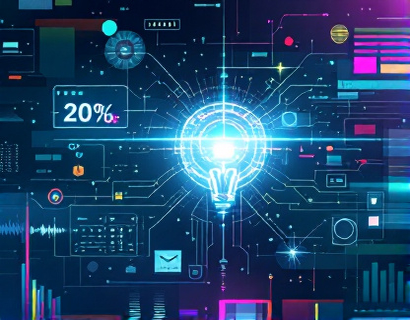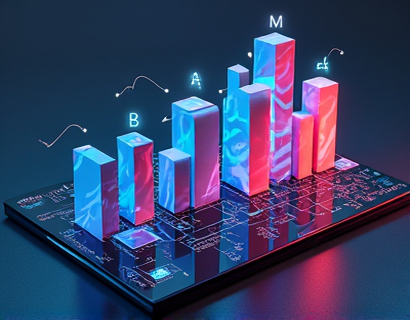Transforming Digital Engagement: The Synergy of Crypto and AI
The intersection of cryptocurrency and artificial intelligence is ushering in a new era of digital engagement, redefining how users interact with technology and each other. This convergence is not just a technological advancement but a paradigm shift that promises to enhance connectivity, personalization, and security in the digital space. As we delve into the transformative power of next-generation technologies, it becomes evident that the synergy between crypto and AI is set to revolutionize various aspects of the tech ecosystem, offering unprecedented growth and engagement.
Understanding the Basics: Crypto and AI
To fully appreciate the impact of this convergence, it's essential to understand the fundamental concepts of both cryptocurrency and artificial intelligence. Cryptocurrency, often referred to as digital or virtual currency, operates on a decentralized network known as a blockchain. This technology ensures transparency, security, and immutability, making it an ideal medium for transactions that require trust and verification without the need for intermediaries.
Artificial intelligence, on the other hand, encompasses a range of technologies designed to simulate human intelligence processes such as learning, reasoning, and self-correction. AI algorithms can analyze vast amounts of data, identify patterns, and make predictions or decisions with minimal human intervention. When combined, these technologies create a powerful toolset for enhancing digital experiences.
The Convergence of Crypto and AI
The integration of AI into cryptocurrency systems brings about significant improvements in efficiency, security, and user experience. One of the primary areas where this synergy shines is in the development of smart contracts. Smart contracts are self-executing contracts with the terms of the agreement directly written into code. AI can optimize these contracts by analyzing complex scenarios, predicting outcomes, and automating execution based on predefined conditions, thereby reducing the risk of errors and fraud.
Another critical area is in the realm of decentralized finance (DeFi). DeFi platforms leverage blockchain technology to provide financial services such as lending, borrowing, and trading without traditional financial intermediaries. AI algorithms can enhance DeFi by offering sophisticated risk management tools, personalized financial advice, and automated trading strategies. This not only makes financial services more accessible but also more efficient and tailored to individual needs.
Enhancing User Engagement through Personalization
One of the most immediate benefits of combining crypto and AI is the ability to create highly personalized user experiences. AI-driven analytics can process vast amounts of user data to understand preferences, behaviors, and needs. This data can then be used to tailor content, recommendations, and services, making the digital experience more relevant and engaging for each user. In the context of crypto, this means that users can receive customized investment advice, portfolio management tools, and market insights that are finely tuned to their specific goals and risk tolerance.
For instance, a crypto trading platform powered by AI can analyze a user's trading history, market trends, and psychological patterns to suggest optimal trading strategies. This level of personalization not only enhances user satisfaction but also increases the likelihood of successful trades and higher returns.
Security and Trust: A Critical Component
Security is a paramount concern in the crypto space, and AI plays a crucial role in bolstering it. AI algorithms can detect and mitigate potential security threats in real-time by monitoring transactions, identifying unusual patterns, and alerting users to potential risks. This proactive approach to security helps build trust among users, a critical factor for the widespread adoption of crypto technologies.
Moreover, AI can enhance the verification processes in decentralized systems, ensuring that only legitimate users access certain services. Biometric authentication, for example, can be integrated with blockchain to provide a secure and seamless way to verify identities, reducing the risk of fraud and unauthorized access.
Innovative Applications in Various Industries
The synergy between crypto and AI extends beyond finance, with applications across various industries. In the healthcare sector, AI can analyze medical data stored on a blockchain to provide secure and privacy-preserving insights for research and treatment. This not only enhances the quality of care but also ensures that patient data is handled with the utmost security and compliance.
In the supply chain industry, blockchain combined with AI can offer transparent and traceable logistics. AI can optimize routes, predict delays, and ensure compliance with regulations, while blockchain ensures that all transactions and movements are recorded and verifiable. This level of transparency and efficiency can significantly reduce costs and improve service reliability.
Driving Growth through Advanced Solutions
The convergence of crypto and AI is not just about enhancing existing services but also about creating entirely new solutions that drive growth and innovation. For businesses, this means access to advanced tools for data analysis, customer engagement, and operational efficiency. Startups can leverage these technologies to disrupt traditional industries and create new market opportunities.
For developers and entrepreneurs, the tools and platforms that integrate crypto and AI provide a fertile ground for innovation. Development frameworks and APIs that support smart contracts, decentralized applications (dApps), and AI-driven features are becoming more accessible, lowering the barriers to entry for creating cutting-edge applications.
Challenges and Considerations
Despite the numerous benefits, the integration of crypto and AI is not without challenges. Regulatory uncertainties remain a significant hurdle, as governments worldwide are still grappling with how to classify and regulate these emerging technologies. Compliance with data protection laws, such as GDPR, is crucial to ensure that user data is handled ethically and legally.
Another consideration is the technical complexity involved in developing and maintaining systems that combine blockchain and AI. Developers need to possess a deep understanding of both domains to create robust and efficient solutions. However, as the ecosystem matures, more resources and tools will become available to simplify these processes.
The Future of Digital Engagement
The future of digital engagement is increasingly intertwined with the advancements in crypto and AI. As these technologies continue to evolve, we can expect even more sophisticated and seamless interactions between users and digital services. The potential for decentralized autonomous organizations (DAOs), powered by AI, to manage and govern communities and projects is just one exciting frontier.
Moreover, the integration of augmented reality (AR) and virtual reality (VR) with blockchain and AI can create immersive digital experiences that blur the lines between the physical and digital worlds. Users will have the ability to interact with virtual environments and assets in ways that were previously unimaginable, further enhancing the richness of digital engagement.
In conclusion, the convergence of cryptocurrency and artificial intelligence is transforming the digital landscape, offering unprecedented opportunities for growth, security, and engagement. As the tech ecosystem continues to evolve, the synergy between these technologies will play a pivotal role in shaping the future of digital interactions, making them more intuitive, secure, and personalized.










































